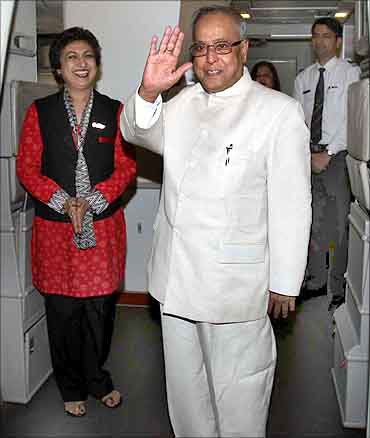
Decades of being right in the thick of and down in the weeds of the political hustings -- and of late being the go-to guy for damage control as far as the Congress party is concerned -- has made Finance Minister Pranab Mukherjee the master of circumspection.
Needless to say, two stints as External Affairs Minister have also helped him to tweak all of the nuances and made him the quintessential diplomat.
Hence all efforts by this correspondent to elicit some clear-cut responses on issues like the fate of the nuclear liability bill and if caps were justified in the wake of the Bhopal verdict, were met with noncommittal answers.
On economic questions, Mukherjee was only too willing to elaborate, but even on a question like Dow Chemical's absolving itself of any responsibility to clean up the old Union Carbide plant, one couldn't get the wily politician to show any angst or emotion.
While on the fate of the nuclear liability bill he said since it's in the legislative process it would not be prudent to comment, on whether caps on damages were justified, he said it was a hypothetical question at this time.
On corporate responsibility by Dow Chemical, which has absolved itself of any responsibility for the clean-up of the old Union Carbide plant, Mukherjee said he would reserve comment until the group of ministers appointed by the prime minister to study this issue came up with its report.
. . .
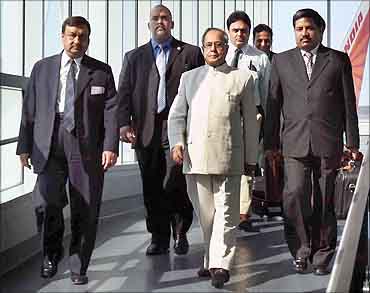
On the sidelines of the CEOs Forum, you had separate bilaterals with Secretary of State Hillary Clinton and your counterpart (Treasury Secretary) Tim Geithner. What are the deliverables you take away in terms of consummating some of these before President Obama's trip to India?
In fact, we have identified a number of projects, what could be doable and after going back we will revisit these issues.
I intend to appoint a small group under the Deputy Chairman, Planning Commission (Montek Ahluwalia) who will make recommendations for practical implementation of these projects over a course of time.
Of course, it cannot be done in two weeks or two months. It will take some time. But there should be a clear roadmap.
The convergence of those on the areas where cooperation should be widened and deepened has been identified -- in infrastructure, clean energy, education, health, biotechnology. Now let this process of identification be translated into working out actionable projects and programs. That job would be done.
. . .
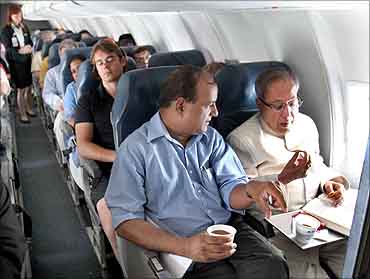
Evidently the synergy at the CEOs Forum and the commitment to move the economic relationship forward was palpable and you yourself have said that Montek Ahluwalia will head the group to implement a plan of action. You did say that there would be this game plan in terms of consummating some of these deliverables. But at the same time the CEOs on the American side had spoken of impediments from investment caps to insurance sector being restricted, etc. How do you propose to alleviate some of these concerns?
Problems are there and if we have the determination to resolve the problems, we'll be able to find a way out and that is what we intend to do.
How will China's decision to allow its currency -- the yuan -- to appreciate against the US dollar affect the Indian economy, Indian exporters, Indian currency?
Not to a great extent. It will affect our export earnings to some extent. But since the Chinese have expressed their intention to adopt a flexible policy it would have a positive impact on the world economy, and India will also be co-share to that. But in our bilateral relations, it does not have any great impact on it.
. . .
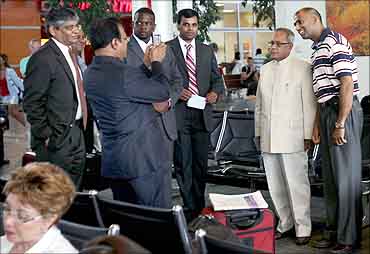
The new Direct Taxes Code will come into effect from April 1, next year, and while it appears that the salaried class may be broadly happy with the revised code, the harsher provisions for investments in stocks and mutual funds might dampen people's enthusiasm. How do you respond to this contention?
First of all, one thing needs to be kept in mind: these are the indicative rates. As per constitutional practice in India, the writ of taxations is determined by Parliament.
Executive can indicate, but the final authority lies with Parliament. Therefore, those who are expressing their optimism or pessimism on the indicative quotes, are not relevant unless it finally takes the shape after getting the Parliament nod.
You have said your target is to break the barrier of double-digit growth hopefully in 2012-2013. But many believe that India lacks the drivers to reach this goal. What makes you so optimistic considering the undeniable and enormous fiscal deficit and the growing inflation?
I am expecting that in 2011-2012 to reach a GDP growth of 9 per cent. If I can achieve 9 per cent plus in 2011-2012, then it may be possible to break the barrier (of double-digit growth).
I know that there is the fiscal deficit, which has to be breached and I have laid the roadmap before Parliament. This year, I want to bring it down to 5.5 per cent and next year to 4.1 per cent.
So far as inflationary pressures are concerned, I do hope the annual rate of inflation would be moderated and we will end the year with an annual average rate of inflation around 4.5 per cent.
Can the country's current growth pace be sustained by reducing some of the barriers on the infrastructure side and ramping up the SEZ opening process?
Of course, the infrastructure deficiencies are to be made up. I have identified in the meeting of the CEOs Forum also that investment requirement would be anywhere between $850 billion and $1 trillion for the next 5-7 years.
There would be a gap of 25-35 per cent of the fund requirement and these are to be filled in. And expansion of the SEZs is a part of this process. But it is not the only way of building up the infrastructure.
. . .
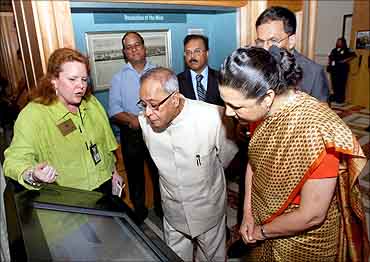
What is the fate of the nuclear liability legislation? There is growing concern among US business and industry that they may lose out on getting a chunk of the nuclear energy market pie after lobbying so strongly for the nuclear deal and now finding that the nuclear liability bill is still in limbo?
You know, this is in the legislative process and I cannot comment on the legislative process in the Indian Parliament.
It is a sovereign body. It is in committee stage and after the committee formulates its recommendations and presents its report before the House, then the government will have to revisit the report of the standing committee and thereafter only formulate its views if any amendment to the proposed legislation is required, and if these amendments are approved by the government.
Then, along with the amended provisions, it will be brought back to the House and then House will debate and pass it.
After the Bhopal verdict are such caps (in the proposed nuclear liability bill) justified, and if this legislation is diluted, can it possibly torpedo the final implementation of the nuclear deal?
That's a hypothetical question because what type of amendments will be proposed nobody knows. So it's very hypothetical at this stage.
Dow Chemical has absolved itself of all responsibility and has said it's for the Government of India and the state government to clean up the old Union Carbide plant. Is this the kind of corporate insensitivity India wants to attract, particularly when India wants infrastructure investment from these huge multinationals?
So far as this issue is concerned, a group of ministers has been set up by the prime minister to look into all aspects relating to Union Carbide and the subsequent events.
The report of the group of ministers is expected to be available to the government shortly and after that it would be possible for me to make any comment. Any comment right now is premature.